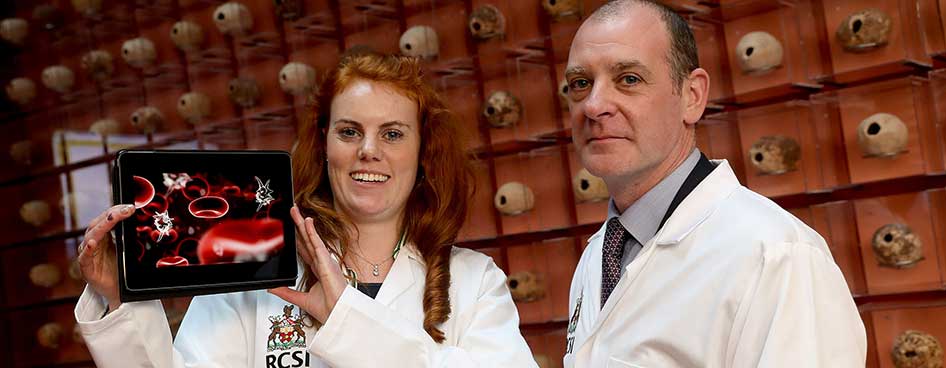With the incidence of sepsis growing by 8% each year, the identification of an effective non-antibiotic therapy for sepsis is critical.
Promising results from a pre-clinical trial led by RCSI gives hope for a new non-antibiotic treatment that could be effective in both the early and more advanced stages of sepsis.
InnovoSep is a potential new therapy developed by a team led by Professor Steve Kerrigan at RCSI, which would stop all sepsis-causing bacteria from triggering organ damage in the early stages of the condition.
The drug appears to act by preventing the bacteria from getting into the bloodstream from the site of infection by stabilising the blood vessels so that they cannot leak bacteria and infect the major organs. It also has the potential to stop progression of sepsis to multiple organ failure in the later stages.
Sepsis occurs when an infection gets into the bloodstream and the body’s own defence system spins out of control trying to fight the infection, which results in multiple organ failure if untreated. There is only a short window of opportunity for treatment of sepsis with the early administration of antibiotics and fluid. However, in many cases antibiotics are not effective due to drug resistance or delays in identifying the type of bacteria that has caused the infection. A non-antibiotic therapy that can be used at all stages of infection against all bacterial causes of sepsis would be a very significant development in the fight against sepsis.
Sepsis, otherwise known as blood poisoning, is a silent killer because it is unpredictable, rapid and can go undiagnosed due to its non-specific signs and symptoms. The signs and symptoms of sepsis mimic those of the flu – high temperature, rapid heart rate, rapid breathing, pain, pale or mottled skin, and generally feeling very sick. Any type of infection can cause sepsis, ranging from seemingly minor infections on the skin, urinary tract infections, pneumonia or appendicitis – even a simple cut, scrape, or break in the skin can allow bacteria to enter the body and potentially lead to sepsis.

Currently there are almost 15,000 cases of sepsis each year in Ireland, with almost 3,000 deaths. Sepsis kills more people than heart attack, lung cancer, colon cancer or breast cancer in Ireland. A staggering 60% of all hospital deaths has a sepsis or infection diagnosis.
The InnovoSep pre-clinical trial is supported by the Enterprise Ireland Commercialisation Fund. The intention is to form a spin-out company for the further clinical development of this technology. Further information for potential investors is available from RCSI’s Head of Innovation, Dr Aoife Gallagher.
RCSI is committed to achieving a better and more sustainable future through the UN Sustainable Development Goals.
